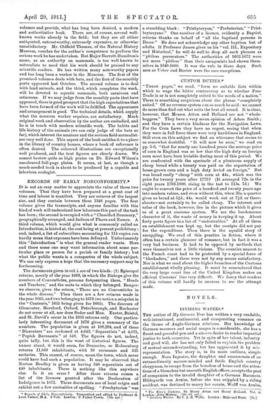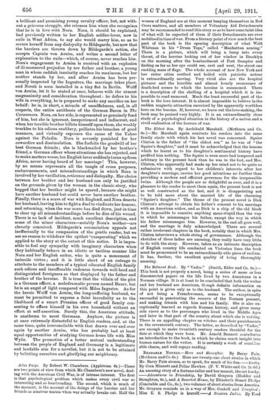NOVELS.
DIVIDING WATERS.*
THE author of My German. Year has written a very readable, well-intentioned, sentimental, and exasperating romance on the theme of Anglo-German relations. Her knowledge of German manners and social usages is considerable, she has a fluent and graceful pen and a sincere desire to render impartial justice to both countries. Yet in spite of her talent, industry and good will, she has not only failed to explain the problem of mutual misunderstanding, but has aggravated it by mis- representation. The story is, in its main outlines, simple enough. Nora, Ingestre, the daughter and amanuensis of an extraordinarily narrow-minded and futile English country clergyman, to escape from the boredorn of home and the atten- tions of a blameless but uncouth English officer, accepts the post of companion to the invalid daughter of a German Baroness: Hildegarde von Arnim, before she was crippled by a riding accident, was deitined to marry her cousin, Wolff von Arnim, * The King's Customs. By Henry Anon and Henry' HolLaul. Vol. London : John Murray. [10s. Cd. net.1 • Dividing Waters. By t. B. Wylie. London : Mills 4,24 Bops. 168.1 a brilliant and promising young cavalry officer, but, not with- out a grievous struggle, she releases him when she recognises that he is in love with Nora. Nora, it should be explained, had previously written to her English soldier-lover, now in exile in West Africa, to say she would marry him, so as to secure herself from any disloyalty to Hildegarde, but now that the barriers are thrown down by Hildegarde's action, she accepts Captain von Arnim, and writes a second letter of explanation to the exile—which, of course, never reaches him. Nora's engagement to Arnim is received with an explosion of ill-mannered prejudice by her father and brother, a young man in whom caddish insularity reaches its maximum, but her mother stands by her, and after Arnim has been per- sonally inspected by the Ingestres, the marriage takes place, and Norab is soon installed in a tiny flat in Berlin. Wolff von Arnim, let it be stated at once, behaves with the utmost magnanimity and consideration throughout : he defers to his wife in everything, he is prepared to make any sacrifice on her behalf: he is, in short, a miracle of unselfishness, and, in all respects, the entire antithesis of the German Baron in The Caravaners. Nora, on her side, is represented as genuinely fond of him, but she is ignorant, inexperienced and indiscreet, and when her terrible brother billets himself upon them, she weakly truckles to his odious snobbery, palliates his breaches of good manners, and virtually espouses the cause of the Yahoo against the Paladin. Nora is severely punished for her cowardice and dissimulation. She forfeits the goodwill of her best German friends ; she is blackmailed by her brother's friend, a German officer whose attentions she has rejected, and to make matters worse, her English lover suddenly turns up from Africa, never having heard of her marriage! This, however, by no means represents all the tangle of cross purposes, embarrassments, and misunderstandings in which Nora is involved by her vacillation, reticence and disloyalty. Her choice between her brother and her husband can only be justified on the grounds given by the woman in the classic story, who begged that her brother might be spared , because she might have another husband but could never have another brother. Finally, there is a scare of war with England, and Nora deserts her husband, leaving him to fight a duel to vindicate her honour, and returning, when the war scare has died down, just in time to clear up all misunderstandings before he dies of his wound. There is no lack of incident, much excellent description, and some of the minor characters—notably Nora's mother—are cleverly conceived. Hildegarde's renunciation appeals not ineffectually to the compassion of the gentle reader, but we see no reason to withdraw the epithet "exasperating" which we applied to the story at the outset of this notice. It is impos- sible to feel any sympathy with imaginary characters when they habitually behave in an idiotic or tactless manner like Nora and her English suitor, who is quite a monument of imbecile virtue ; and it is little short of an outrage to attribute to the members of a typical educated English family such odious and insufferable rudeness towards well-bred and distinguished foreigners as that displayed by the father and brother of the heroine. It is true that the villain of the plot is a German officer, a melodramatic person named Bauer, but he is an angel of light compared with Miles Ingestre. As for the heroic Wolff von Arnim, the long-suffering husband, we must be permitted to express a faint incredulity as to the likelihood of a smart Prussian officer of good family con- senting to efface himself in his own household without an effort at self-assertion. Surely this, the American attitude, is anathema to most Germans. Anyhow, the picture is at once extremely distasteful to English readers, and, at the same time, quite irreconcilable with that drawn over and over again by another Arnim, who has probably had at least equal opportunities of studying German home life with Miss Wylie. The promotion of a better mutual understanding between the people of England and Germany is a legitimate and laudable aim for a novelist, but it is not to be attained by belittling ourselves and glorifying our neighbours.



























































 Previous page
Previous page